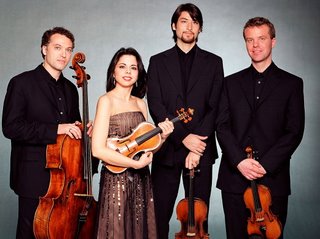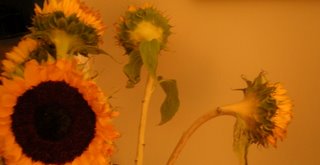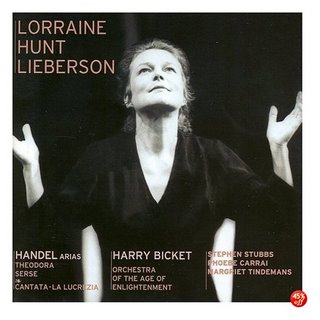Monday, July 31, 2006
Pliable's Path
Pliable has developed such elegant blogging chops that what he delivers is always a rich and sensory experience. A recent post takes the fast lane on a bizarre route that begins with Condolleeza Rice scowling at Brahms, and moves through Hitler, Hanfstaengl and Poulenc ... and then finishes with the voice of Paul Eluard himself, reading his poem "Liberté". Virtuosic blogging. Always an essential read.
Thursday, July 27, 2006
Saturday, July 22, 2006
More Recent Shivers ...

Best "God-I-love-young-musicians" shiver:
Yesterday, the Pacifica Quartet flooded WGBH's Studio One with their vibrant, highly charged playing. And as we talked, I had the quartet's eight exuberant eyes to wonder at ... all of them sparkling at me with an almost disarming sense of playful assuredness. Young players of this caliber always give me the most warm-hearted shivers, and leave me with a sense that the the great string quartets written long ago, and those still unwritten, are in really, really good hands.
The Pacifica played Mozart's "Dissonant" Quartet, and then the profoundly moving Shostakovich 8th. My favorite remark came in response to my asking this:
"It's the Mozart year ... we're all thinking so hard about him, it wouldn't surprise me if we somehow collectively made him reappear. Were he to walk in now and catch you rehearsing, what would you need to ask him?"
Simin Ginatra:
"I think I'd tell him not to waste his time on us ... just please go write some more music."
Watch WGBH's webcast page over the next couple of weeks for their live performance and interview.

Most recent Schubert shiver:
Many times I have broadcast the luminous and delicious recordings of the Duo Tal and Groethuysen. And I've always reveled in their golden sound and absolute oneness of mind and heart. But last week, the shivers came in little packages (little Schubert packages): Schubert's Deutscher with Two Trios and Two Ländler D.618,
Four Ländler D.814 and the strangely heartbreaking little March for Children in G major, D.928. Yaara Tal was born in Tel Aviv and Andreas Groethuysen in Munich. Combined, they are pure magic. They play on a Fazioli piano for reasons described at some length in the CD booklet.
What a nice present the complete boxed set of Schubert's four-hand piano music would make ...
Sunday, July 16, 2006
QWERTY

I fell strangely in love with typewriters when I was in high school. I even became quick enough that our teacher challenged me to a lunchtime duel. (She won.)
And now I find that Boston has its own typewriter orchestra.
Their QWERTY waltz goes like this.
Aren't you jealous of this town?
Saturday, July 15, 2006
Back

A blog, I can tell you, will whisper and scratch at you, should you neglect it for too many months ...
But a recent comment, the result of a cyber-stumble, has jostled me back to the sphere. Thanks to Paul for the note.
Jeremy Denk's recent posts (especially his funny encounters with frogs) make me think that he's lucky enough to have created a kind of living notebook where he can unburden his unceasingly inventive and associative mind. Nomadic pianists seem required to invent their secondary worlds of intrigue. And especially summer nomads in "FestivaLand" as he calls it, ("a performance, a reception, and an outgoing flight") where problems come up, and there's no time to debate or resolve them. He's now onto the subject which always seems to reject normal vocabulary -- the issue of "leaving a piece alone" ... letting it speak for itself .... Someone in FestivaLand had started in with the "just play it, don't interpret it" line of musical reasoning, prompting Jeremy to blog his heart out ("In my opinion, music doesn't want to be left alone.")
And this brings up the inevitable, somehow inane, discussion of where the player belongs in all the abstract layering of things: the composer's idea; the ideas in the player that the composer's idea inevitably must evoke; the arguable markings that plague the score; the trickery that can come with the visual display (or lack of it) that the player engages in; the ideas that are evoked in the listener's mind, which are born in part because of the player, who has played with his own ideas working urgently in his heart and mind (I hope) ... ideas that have been evoked by the composer's original idea, much of which is, in the end, up for deliciously abstract speculation.
There is a private realm within a musician. It's vast. It's not to be described. And it comes to life within the phrases (the ideas, the statements, the utterances, the music) of the composer. This realm is vital ... it must remain turned on. The door to it should never close. I suspect it's the same realm from which poetry is born.
Far beyond associative, it is a deep and fertile place in the imagination that connects us directly to music. Its power gives light and air and gravity and sensation and despair and shadow -- and all that's privately the most human of things -- to every phrase that a real musician really plays.
And great music invariably lights up this place in the heart/mind/imagination, so that the music becomes alive and develops a deeply satisfying sense of color, achingly human for the player, and mysteriously touching even for the listener who has never heard it before.
When the subject of "interpreting" and not mucking around with the score comes up ... when a listener makes conversation by implying that too many people "do too much" with the music, it brings all this up.
It's a hard conversation.
But play anything -- any phrase ... even just two consecutive notes ... with every marking intact, but without access to the poetic realm, and there is a dry and two-dimensional result that can feel downright offensive. Mostly, it's sad.
Today when I was teaching, I noticed that months ago I'd penciled in to the top of one of the pages of my student's Schubert sonata "Lorraine Hunt Lieberson -- Handel arias" ...
My heart skipped a beat. She was someone so completely connected to the poetic realm that not a single soul seemed to miss out.
I had wanted my student to be inspired by her. To find a way to be hugely communicative, even when the marking is pp.
Or better,
because the marking is pp.

Subscribe to:
Posts (Atom)
